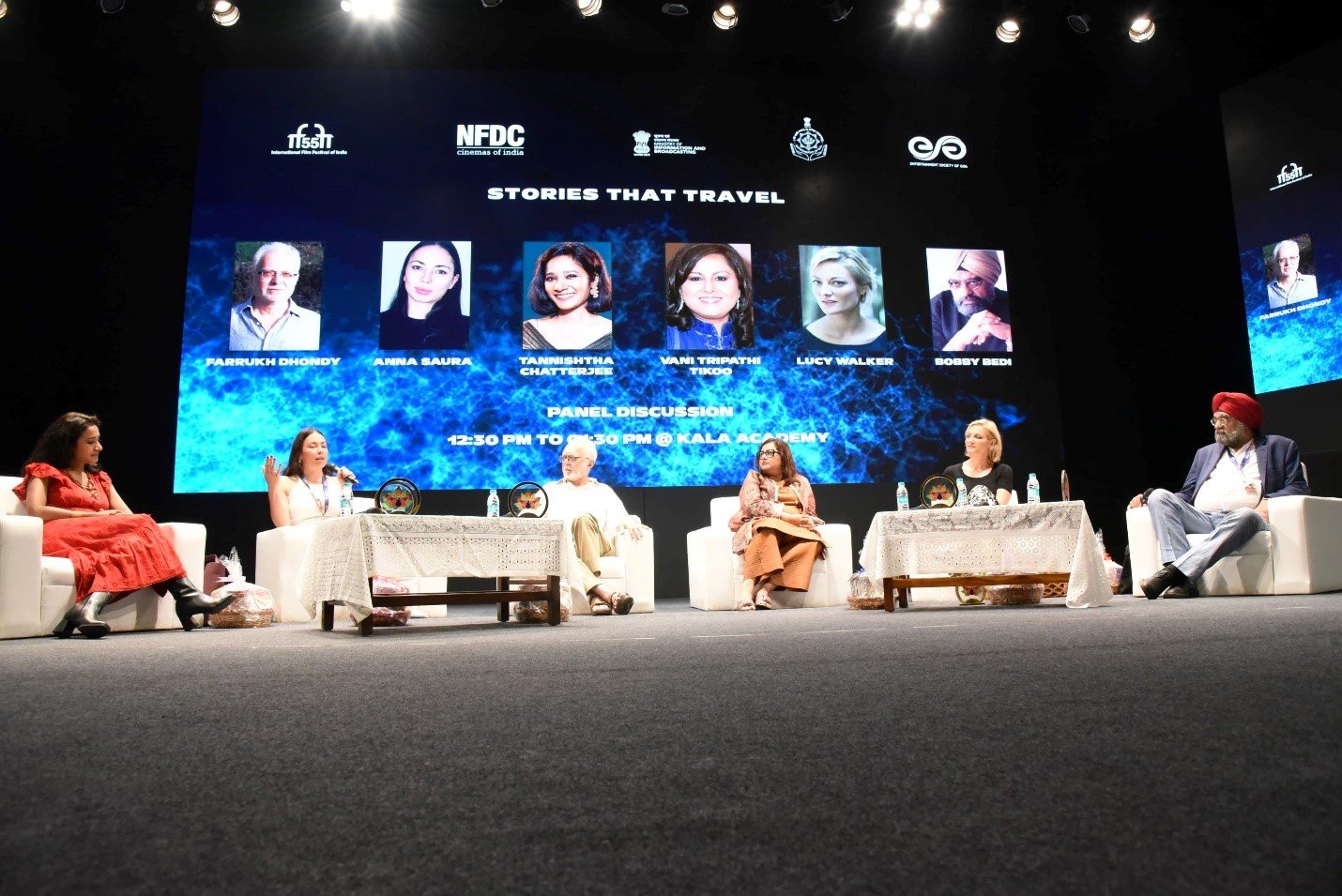Human emotions are universal and cinema being a language agnostic medium, can connect with people around the world. Do stories and the art of storytelling have the power to transcend borders, languages, and cultures? A panel discussion on this topic titled ‘Stories That Travel’ was held on the sidelines of film screenings in 55th International Film Festival of India (IFFI) at Kala Academy in Panaji today.
The esteemed panellists included Indian-born British Parsi writer, playwright, screenwriter Farrukh Dhondy, Spanish producer Anna Saura, illustrious actor Tannistha Chatterjee, renowned actor and producer Vani Tripathi Tikoo, and English documentary film director Lucy Walker. Indian film director and producer Bobby Bedi moderated the discussions which threw light on the various nuances of story-telling, which are universal, yet can be region, country or culture specific.
Bobby Bedi opened the session with the statement that India is a globally popular and robust film production industry; but Indian film makers do not think about an audience beyond the diaspora and hence, often cannot connect with an international audience.
Documentary film maker Lucy Walker, whose film ‘Mountain Queen: The Summits of Lhakpa Sherpa’ has recently garnered appreciation in film festivals including IFFI feels that “one should make films about people and creatures that they care about”. She likes to travel around the world, but not as a tourist, but to make films on local people, she stated.
Vani Tripathi Tikko said, “Vasudaiva Kudumbakam” (The World is One Family) is the mantra of India. It has always been a land of story tellers and “Kathavachan” (story-telling) has always been our tradition. She opined that stories that came from outside India are also told in the country. “Eventually stories which travel have an element of universality and cultural connect”, she added.
Farrukh Dhondy delved into the history of story-telling in the human race. “Every tribe, every culture has its own mythologies. That is where the story starts! Mythologies tell us about ethics of a culture. Some travel, while some don’t”. He opined that all the stories do not connect with audience equally everywhere in the world. He went on to explain that Raj Kapoor’s stories about Indian peasantry and urban poor connected with a Soviet audience and won awards in Kazakhstan, Uzbekistan and nearby countries, though it did not find resonance in US or Europe in the same sense. But on the other hand, Satyajit Ray’s novelistic stories could connect with audience in Europe and US.
He added that in the next phase came stories on modern reality that exists everywhere in the world and films like Slumdog Millionaire and Salaam Bombay connected with many around the world. Monsoon Wedding which has a universal message of ‘Love Conquers All’ found a connect with western audiences. So did Bandit Queen, which inspite of being in a different language and set in a different culture, amazed the western audience with its story of a woman fighting for her rights, stated Farrukh Dhondy.
Anna Saura, daughter of noted Spanish film maker Carlos Saura, said that in the internet era, people have access to content from around the world and hence all stories have a global audience. She stressed on the fact that “Stories that belong to us as humans will have a connect all over the world”. These stories can be from anywhere in the world, she stated. Anna Saura opined that film festivals and OTTs have given a platform to documentaries and short films as well, and therefore, opened up a huge market for all. However, she said that producers and film makers have a responsibility to promote projects all over the world. In this context, she said that there are themes that can travel and be understood all over the world and language is not a barrier for that.
Ace actor Tannistha Chatterjee brought a performer’s perspective to the discussions on appeal of stories for a global audience. She stated that Indian mass audience are more TV friendly and cinema is secondary to them. The actor explained that Indian cinema is loud and celebratory, much like the culture, while in the west, emotions are expressed in a more subtle manner. Cultural nuances also change from country to country, she added.
Tannistha Chatterjee also mentioned that emotions are universal. “But when the theme is local, it travels”, she said. We should not try to make something that is universal, rather focus on telling local stories, stated the actor. “Universal language of culture and emotions always travel.”
Bobby Bedi mentioned about films like Aavtar where a local story from India had taken the shape of a global super story. Farrukh Dhondy reminded that American super hero films have a global audience as well. Speaking on this, Lucy Walker stated that the superheroes are also local people who rise to the occasion.
The discussions ended on a common note that local stories having universal emotional appeal will win over audiences around the world.


